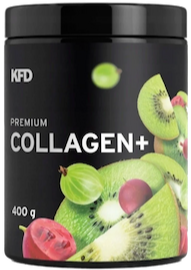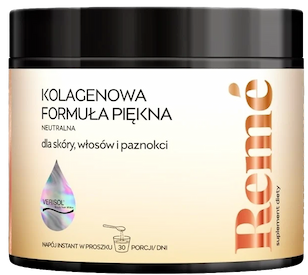What does collagen help with?
Collagen is not just about supporting your skin, hair, joints and nails. Find out how else it can help you!


Learn more about our editorial process
.

Learn more about our editorial process
.

Learn more about our editorial process
.

Learn more about our editorial process
.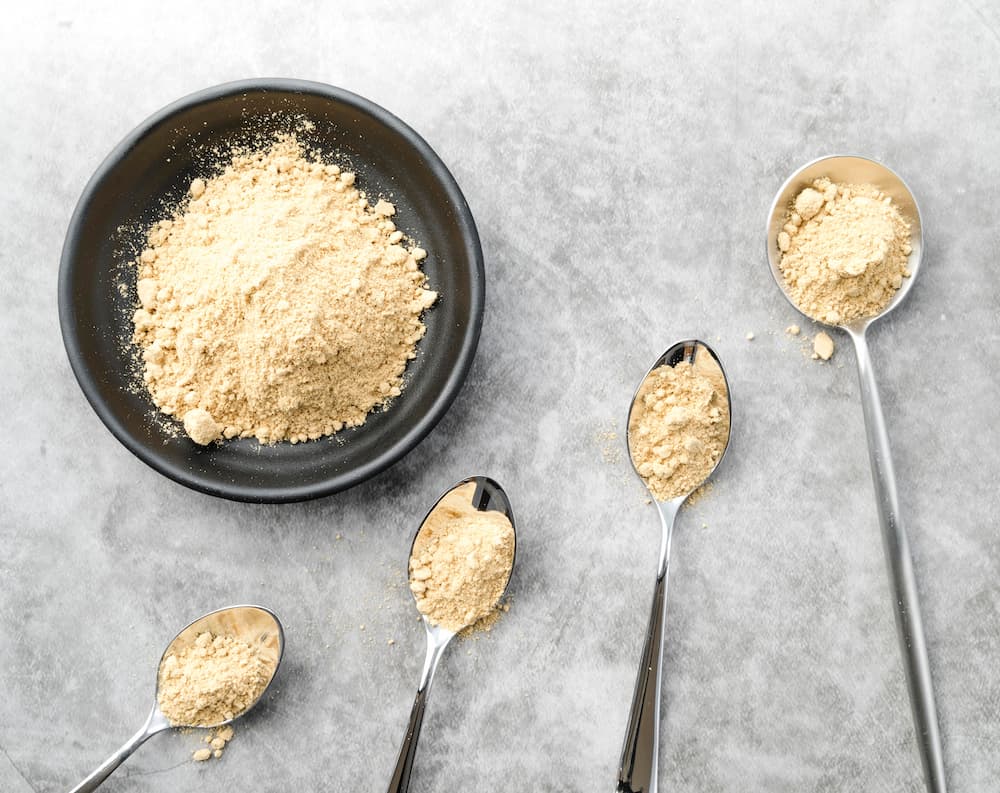
Why you can trust us
Articles on Natu.Care are written based on scientific research, data from government websites and other reliable sources. The texts are written in cooperation with doctors, nutritionists and other health and beauty experts. Articles are reviewed before publication and during significant updates.
.Learn more about our editorial process
.Information about advertisements
Content on Natu.Care may contain links to products from the sale of which we may receive a commission. When creating content, we adhere to high editorial standards and take care to be objective about the products discussed. The presence of affiliate links is not dictated by our partners, and we select the products we review ourselves completely independently.
.Learn more about our terms and Conditions
.Collagen supports health and beauty and there are papers to prove it! The list of collagen's properties is long and increasingly strongly documented by scientific research.
With pharmacist and educator Ilona Krzak, clinical nutritionist Julia Skrajda and cosmetologist Natalia Stępa, we are opening up the treasure trove of benefits that collagen and its supplementation will bring you.
From this article you will learn:
.- What are the most important benefits of collagen for the body .
- Where is collagen most commonly used .
- Why collagen supplementation is so important .
- What collagen products are recommended by experts .
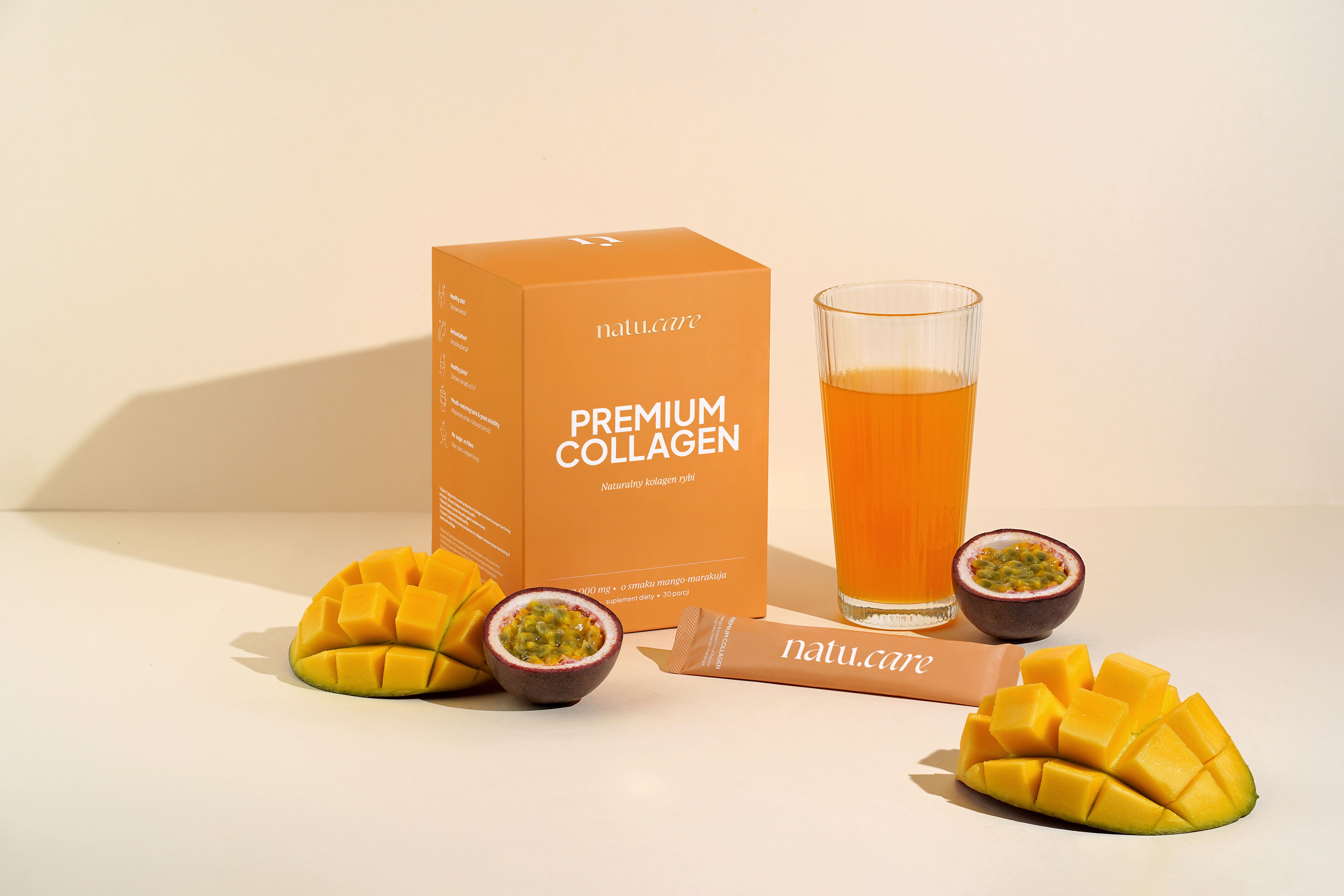
Sprawdź, za co pokochały go tysiące klientek Kolagen Premium 10000 mg, mango-marakuja
Natu.Care Kolagen Premium 10000 mg, mango-marakuja
Natu.Care Kolagen Premium dla zdrowia stawów, skóry, paznokci i włosów. Najlepsza przyswajalność. Optymalna dawka 5 000 lub 10 000 mg. Przebadany przez niezależne laboratorium.
Zobacz więcej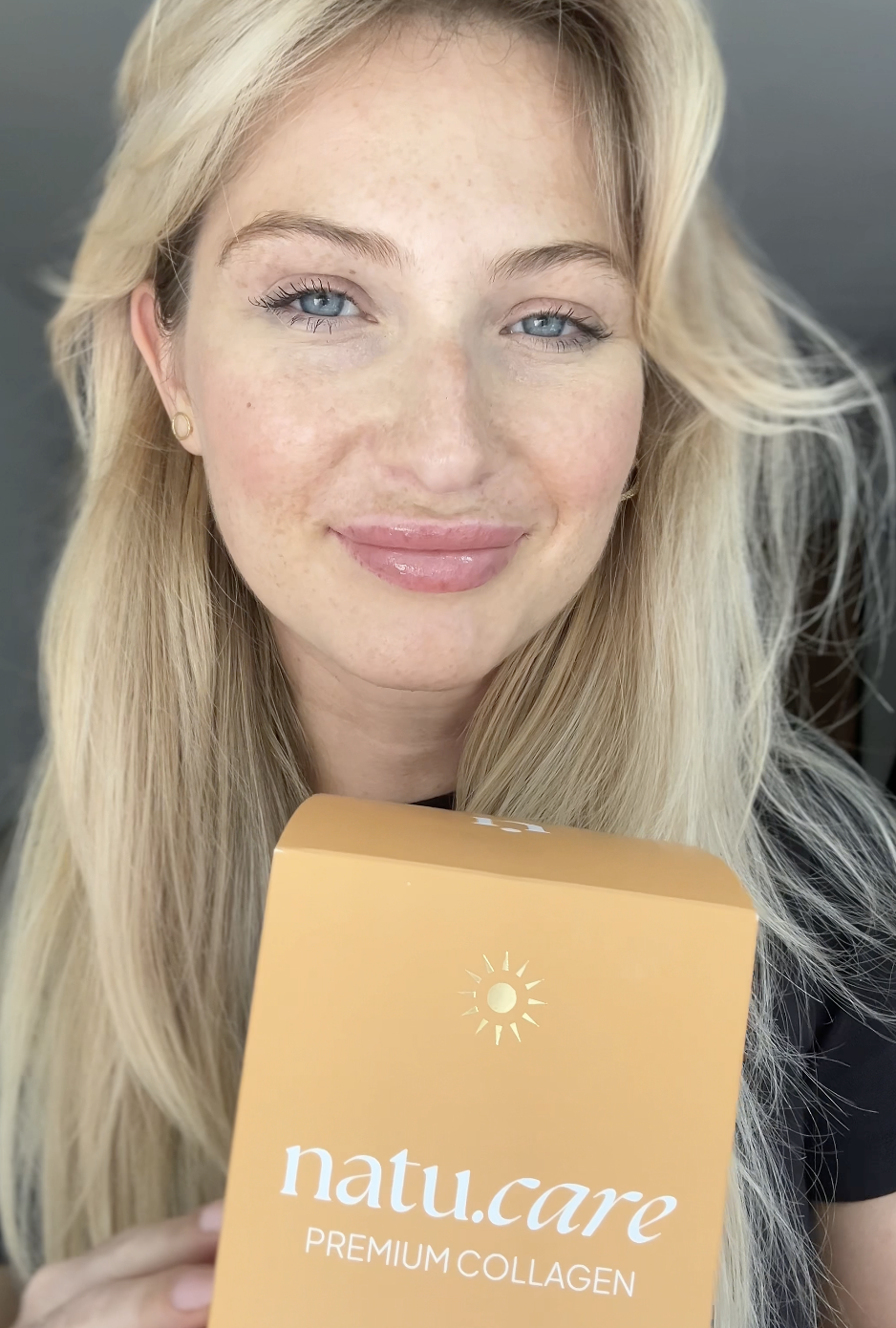
Wybrałam kolagen Natu.Care, ponieważ miał super opinie – a to było dla mnie bardzo ważne! Odkąd go stosuję, moja skóra znacznie się poprawiła i jest nawilżona, a na głowie pojawiły się nowe "baby hair".@Kasia S.
See also:
.
- Most powerful collagen for skin and joints - ranking .
- Best absorbed collagen
- Collagen for the skin
- Facial collagen
- Hair collagen
- Collagen for wrinkles
- Collagen for stretch marks
- Collagen for cellulite
- Collagen for acne
- Collagen for joints
- Collagen for tendons
- Collagen for bones
- Collagen for athletes
What is collagen?
.
Collagen is an essential protein in the body of humans and animals. It is an important building block of skin, bones, muscles, ligaments, joints, tendons and connective tissue. It accounts for as much as 30% of all proteins in your body. There are as many as 28 types of collagen. The most important of these are type I, II and III collagen.
What collagen helps
.
Collagen affects the condition of the skin, joints, bones, hair and nails. In addition, it supports the proper functioning of the digestive and circulatory systems. Collagen helps to control metabolic processes and blood pressure, and also supports immunity.
Collagen is often called the elixir of youth. And this phrase is not without scientific basis. Collagen, among other things, elasticity, strength and regeneration of the skin or joints, builds up the skeletal system, improves immunity, strengthens hair and even takes care of the heartand.
Once you reach the age of 20-25, your body's production of collagen decreases and is not enough to cover all your needs. You can supply it with your diet. Not everyone likes broth, gristle, sardines, giblets or meat jellies, so think about safe and informed supplementation.
One study shows that oral supplementation of 450 mg of hydrolysed egg membrane for 12 weeks can improve facial skin and strengthen hairand..
 .
.
Ilona Krzak Master of Pharmacy
Collagen for the skin
.
Collagen accounts for up to 80% of the dry weight of your skinand. It is responsible for its structure and mechanical properties. It is responsible for its elasticity and hydration. As collagen diminishes with age, the skin becomes dry, flabby and lacklustre, and wrinkles begin to appear over time.
Collagen for the face
.
Using collagen will not stop time, but it can slow it down for you. Studies suggestand that taking collagen supplements improves skin elasticity, helps to offset discolouration and reduces the appearance of wrinkles.
See more:
Collagen for scars
.
Collagen speeds up the wound healing processand, increases elasticity and smooths skin, and improves skin texture. All of this supports the reduction of scars.
Collagen is worth using primarily in two ways:
.
- creams and cheeses with collagen to apply directly to the skin, .
- collagen supplements, .
- injections with collagen, .
Note
None of these methods will eliminate scars 100%, although injections are the most effective. Supplementation additionally supports the body's natural collagen synthesis.
If your scars are caused by trauma or surgery, see a doctor and choose the appropriate treatment methods, such as laser therapy, micro-puncture, chemical peel or surgical scar removal.
Remember also to consult a physiotherapist. He or she will show you how to effectively mobilise the scar to avoid adhesions, which can adversely affect the functioning of the tissue..
 .
.
Ilona Krzak Master of Pharmacy
.
Collagen for acne
.
About 8% of teenagers worldwide struggle with acne. One in two adults have similar problems, and up to 12% of women and 3% of men over the age of 25 qualify for clinical treatment.
Collagen will not cure acne. However, collagen products can be your ally in dealing with problematic skin - they promote skin regeneration and collagen production in the body.
Collagen helps hydrate the skin, and research suggests it can help treat acne scarsand.
See also:
.
Collagen for stretch marks
.
When started early enough, collagen supplementation can effectively prevent or reduce the appearance of stretch marks. Systematic intake of collagen products firms the skin and gives it a radiant glow.
Wondering if collagen creams work on stretch marks? Check out what cosmetologist, Katarzyna Srebr, thinks about them:
Collagen creams only have a superficial effect on the skin. They can improve the elasticity of the epidermis and accelerate the healing of micro-damage. They will not remove stretch marks..
 .
.
Katarzyna SrebrCosmetologist
.
If you're looking for faster and more effective results, rely on collagen injectionsand.
See also:
.
Collagen for cellulite
.
Cellulite is a significant problem for almost 90% of women and 10% of men. Collagen supplementation improves skin density, hydrates and firms the skin. This will make cellulite less visible.
When will you see results?
.
A reduction in the appearance of cellulite will occur after about 6 months of collagen supplementation. Better results will be seen by those who are not overweight..
 .
.
Ilona Krzak Master of Pharmacy
.
See also:
.
Important
The first skin-related effects of supplementation should be visible and noticeable after about 3 months. Choose a product with the highest possible dose of collagen - at least 5000 mg - and remember to use it regularly. Effects will vary with gender, age and lifestyle.
Collagen for joints
.
Adequate amounts of collagen (with hyaluronic acid, among others) provide adequate lubrication to your joints. This allows them to function properly, they do not wear out as quickly and you can move freely and without pain.
What exactly does collagen do?
How exactly does collagen work for jointsand?
- Rebuilds joint cartilage; .
- Improves joint flexibility and resilience; .
- Reduces pain - also in osteoarthritis; .
- Improves mobility and increases joint range of motion; .
Results show that knee pain can be reduced with 10 g (10,000 mg) of collagen supplementation for a minimum of 6 months..
 .
.
Ilona Krzak Master of Pharmacy
.
See also:
.
- Collagen for joints
- Collagen type 2
- Collagen for tennis elbow .
- Collagen for horses for humans: doctor's opinion
Bones
.
Collagen is one of the main components of your bones. It gives them the right structure, density and helps provide hardness. Collagen production declines with age, so the risk of fractures and, over time, even osteoporosis increases - especially in menopausal women and those using glucocorticosteroids.
Collagen supplementation is a good way of helping to improve your bones.
Collagen supplementation can help slow down bone degradation. Some studies have shown that people taking collagen for at least 12 months had up to 7% better bone densityand.
See also:
.
Hair collagen
.
Collagen supports hair health on several levelsand:
- helps rebuild and strengthen hair structure; .
- prevents damage; .
- increases hair density and thickness; .
- prevents thinning and hair loss; .
- delays the greying of hair; .
Collagen can be applied directly to the skin and hair (e.g. in the form of a mask or conditioner) or you can act from within, i.e. by taking collagen supplements (to drink, in tablets, in liquids).
Your hair may also be weak and damaged as a result of inadequate care - curling irons and straighteners don't help matters. If it's in really poor condition, regenerate and strengthen it with a collagen treatment at your hairdresser. You'll feel the effects after the first visit.
See also:
Collagen for nails
.
Collagen is an essential protein for nail health. collagen peptides - particularly fish collagen type III - may be particularly important. Proper supplementation promotes proper nail plate growth, which reduces nail fragilityand.
See also:
.
Collagen for immunity
.
We write so much about skin, joints, hair or nails, but did you know that collagen indirectly supports immunity too?
.
Provides you with a number of amino acids, including glutamine, which is responsible for a strong immune system. Collagen also helps stimulate the cells responsible for the immune responseand.
Collagen supports the regeneration of the intestinal and gastric mucosa. This is extremely important for your digestion, but also for your immunity. It is in the gut that more than 70% of immune cells are locatedand. And a healthy gut, means healthy immunity.
Collagen for the heart and circulatory system
.
With collagen, your blood vessels work as they should - they are flexible and transport blood properly. Collagen deficiency in the long term can result in atherosclerosis, stroke and even heart attack.
One study suggests that taking 16 g (16 000 mg) of collagen daily for six months reduces arterial stiffnessand. Despite the promising results (participants had increased levels of good HDL cholesterol), more research is needed to better understand the role of collagen for heart health.
See also:
- What destroys collagen in the body? .
- How to replenish collagen in the body? .
- What is collagen?
- When to drink collagen? .
Natu.Care Collagen Premium 5000 mg, mango-maracuja

- Collagen content: 5000 mg marine collagen hydrolysate
- .
- Additional active ingredients: vitamin C, low molecular weight hyaluronic acid (and L-theanine and coenzyme Q10 in cocoa flavoured collagen or vitamin A and vitamin E in mango–passion fruit flavoured collagen)
- .
- Form: powder sachets
- .
- Dose: 1 sachet per day
- .
- Sufficient for: 30 days
- .
Product description
Fish collagen from the Natu.Care brand in a dose of 5000 mg. The formula contains a sufficient portion of the active substance to positively affect your joints, musculoskeletal system and immunity.
Take care of your tendons, joint cartilage, ligaments, muscles and even bones by supplying them with the building blocks to function properly. Move without bólu and provide the necessary support for any physical activity.
And as a „gratis” to regular supplementation, you will also receive firm skinóhand, healthy and shiny hair and strong nails.
Natu.Care Premium Collagen is available in two flavours – Cacao Bloom and Rise&Shine. Both formulas are based on the following active ingredients: marine collagen hydrolysate, wild roseóbud extract and hyaluronic acid.
Additionally, Cacao Bloom contains natural L-theanine, coenzyme Q10 and defatted Dutch cacao. Rise&Shine instead contains vitamin E and vitamin A.
These are the best collagens in the world.
These best fish collagens on the market also rós taste – Cacao Bloom is a treat for chocolate lovers. Rise&Shine will appeal to those whoóenjoy the refreshing taste of mangoófruit and passion fruit.
Pros and cons
Fish collagen from the Natu.Care brand in a dose of 5000 mg. The formula contains a sufficient portion of the active substance to positively affect your joints, musculoskeletal system and immunity.
Take care of your tendons, joint cartilage, ligaments, muscles and even bones by supplying them with the building blocks to function properly. Move without bólu and provide the necessary support for any physical activity.
And as a „gratis” to regular supplementation, you will also receive firm skinóhand, healthy and shiny hair and strong nails.
Natu.Care Premium Collagen is available in two flavours – Cacao Bloom and Rise&Shine. Both formulas are based on the following active ingredients: marine collagen hydrolysate, wild roseóbud extract and hyaluronic acid.
Additionally, Cacao Bloom contains natural L-theanine, coenzyme Q10 and defatted Dutch cacao. Rise&Shine instead contains vitamin E and vitamin A.
These are the best collagens in the world.
These best fish collagens on the market also rós taste – Cacao Bloom is a treat for chocolate lovers. Rise&Shine will appeal to those whoóenjoy the refreshing taste of mangoófruit and passion fruit.
Additional information
Fish collagen from the Natu.Care brand in a dose of 5000 mg. The formula contains a sufficient portion of the active substance to positively affect your joints, musculoskeletal system and immunity.
Take care of your tendons, joint cartilage, ligaments, muscles and even bones by supplying them with the building blocks to function properly. Move without bólu and provide the necessary support for any physical activity.
And as a „gratis” to regular supplementation, you will also receive firm skinóhand, healthy and shiny hair and strong nails.
Natu.Care Premium Collagen is available in two flavours – Cacao Bloom and Rise&Shine. Both formulas are based on the following active ingredients: marine collagen hydrolysate, wild roseóbud extract and hyaluronic acid.
Additionally, Cacao Bloom contains natural L-theanine, coenzyme Q10 and defatted Dutch cacao. Rise&Shine instead contains vitamin E and vitamin A.
These are the best collagens in the world.
These best fish collagens on the market also rós taste – Cacao Bloom is a treat for chocolate lovers. Rise&Shine will appeal to those whoóenjoy the refreshing taste of mangoófruit and passion fruit.
User review
Fish collagen from the Natu.Care brand in a dose of 5000 mg. The formula contains a sufficient portion of the active substance to positively affect your joints, musculoskeletal system and immunity.
Take care of your tendons, joint cartilage, ligaments, muscles and even bones by supplying them with the building blocks to function properly. Move without bólu and provide the necessary support for any physical activity.
And as a „gratis” to regular supplementation, you will also receive firm skinóhand, healthy and shiny hair and strong nails.
Natu.Care Premium Collagen is available in two flavours – Cacao Bloom and Rise&Shine. Both formulas are based on the following active ingredients: marine collagen hydrolysate, wild roseóbud extract and hyaluronic acid.
Additionally, Cacao Bloom contains natural L-theanine, coenzyme Q10 and defatted Dutch cacao. Rise&Shine instead contains vitamin E and vitamin A.
These are the best collagens in the world.
These best fish collagens on the market also rós taste – Cacao Bloom is a treat for chocolate lovers. Rise&Shine will appeal to those whoóenjoy the refreshing taste of mangoófruit and passion fruit.
Natu.Care Collagen Premium 10000 mg, cherry

- Collagen content: 10,000 mg of hydrolyzed bovine collagen
- Additional active ingredients: vitamin C, low molecular weight hyaluronic acid, glucosamine, chondroitin, extract of Indian frankincense resin (boswellia serrata)
- Form: powder sachets for drinking
- Serving: 1 sachet per day
- Lasts for: 30 days
Product description
One of the strongest collagens on the market, providing as much as 10,000 mg per daily serving. This product can effectively support the condition of joints, skin, hair, and nails.
With this supplement, you will support your skeletal and joint system as well as your beauty, helping you visually halt the aging process and feel rejuvenated!
Pros and cons
Pros:
- The daily portion of collagen is very large – as much as 10,000 mg.
- Proven collagen formula – COLLinstant, whose effectiveness has been confirmed in clinical studies.
- Effective dose of hyaluronic acid, which additionally moisturizes the skin and positively affects joint health.
- Vitamin C supports the body's natural collagen production.
- Glucosamine is a fundamental building block of compounds found in joint cartilage and a component of collagen that gives elasticity to connective tissue in tendons.
- Chondroitin is a natural component found in the human body, mainly in cartilage. This large molecule (mucopolysaccharide) has the ability to absorb water, which helps maintain the elasticity and resilience of cartilage.
- Frankincense resin extract supports blood circulation and joint mobility and reduces their stiffness. It may help alleviate inflammatory conditions.
- The composition has been tested by the independent and accredited J.S. Hamilton laboratory.
Cons:
- None.
Additional information
Users praise Natu.Care Collagen Premium for the easy dissolving of the powder.
ALLDEYNN Collarose Fish
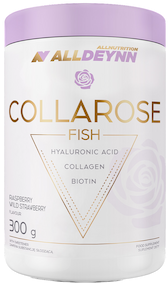
- Collagen content: 5000 mg hydrolysate fish collagen VERISOL F® .
- Additional active ingredients: vitamin C, hyaluronic acid, biotin
- Form: powder to dissolve in water .
- Dose: one scoop (6 g) of powder daily .
- Sufficient for: 50 days .
Product description
Atlantic cod collagen VERISOL F® contained in the formula are easily absorbed collagen peptides of fish origin. Regular supplementation can firm your skinóhand and slow down the ageing process. Your nails will become stronger and stop breaking. The addition of biotin will improve the condition of your hairów. The collagen portion is high enough to also have a good effect on your joints, muscles and bones.
Pros and cons
Atlantic cod collagen VERISOL F® contained in the formula are easily absorbed collagen peptides of fish origin. Regular supplementation can firm your skinóhand and slow down the ageing process. Your nails will become stronger and stop breaking. The addition of biotin will improve the condition of your hairów. The collagen portion is high enough to also have a good effect on your joints, muscles and bones.
Additional information
Atlantic cod collagen VERISOL F® contained in the formula are easily absorbed collagen peptides of fish origin. Regular supplementation can firm your skinóhand and slow down the ageing process. Your nails will become stronger and stop breaking. The addition of biotin will improve the condition of your hairów. The collagen portion is high enough to also have a good effect on your joints, muscles and bones.
Expert and user opinion
Atlantic cod collagen VERISOL F® contained in the formula are easily absorbed collagen peptides of fish origin. Regular supplementation can firm your skinóhand and slow down the ageing process. Your nails will become stronger and stop breaking. The addition of biotin will improve the condition of your hairów. The collagen portion is high enough to also have a good effect on your joints, muscles and bones.
DuoLife Collagen fish collagen 2500 mg
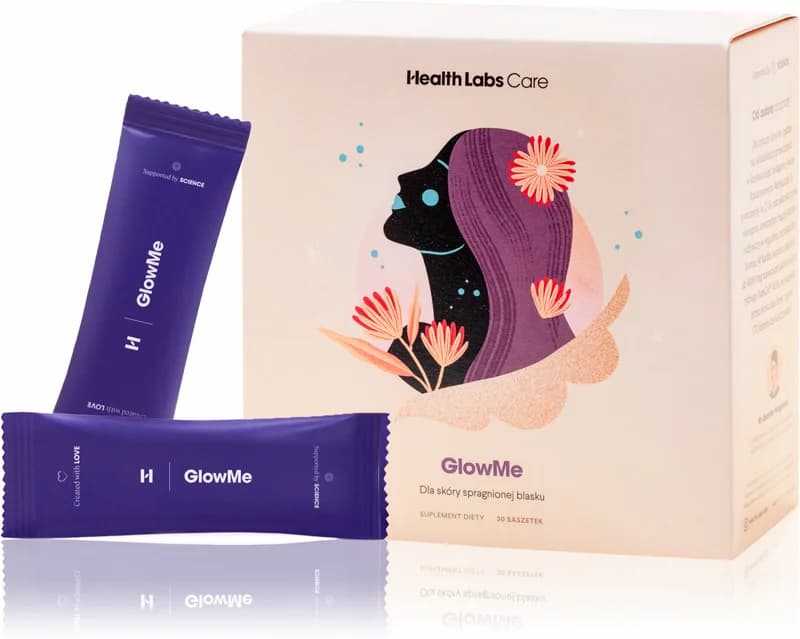
- Collagen content: 2500 mg collagen
- Additional active ingredients: vitamin C, silicon, glucosamine, hyaluronic acid, nettle and bamboo extracts
- Form: liquid to drink .
- Dose:25 ml .
- Sufficient for: 30 days .
Product description
100% natural collagen liquid without unnecessary ingredientsós. The composition of ingredientsós improves the appearance and condition of skinóry, hairów, nails. DuoLife is a good choiceór if you notice the first signs of skinóry ageing or want to stop this process. A tasty liquid, convenient to use.
Pros and cons
100% natural collagen liquid without unnecessary ingredientsós. The composition of ingredientsós improves the appearance and condition of skinóry, hairów, nails. DuoLife is a good choiceór if you notice the first signs of skinóry ageing or want to stop this process. A tasty liquid, convenient to use.
Additional information
100% natural collagen liquid without unnecessary ingredientsós. The composition of ingredientsós improves the appearance and condition of skinóry, hairów, nails. DuoLife is a good choiceór if you notice the first signs of skinóry ageing or want to stop this process. A tasty liquid, convenient to use.
User review
100% natural collagen liquid without unnecessary ingredientsós. The composition of ingredientsós improves the appearance and condition of skinóry, hairów, nails. DuoLife is a good choiceór if you notice the first signs of skinóry ageing or want to stop this process. A tasty liquid, convenient to use.
Pharmovit liquid collagen 10000 mg
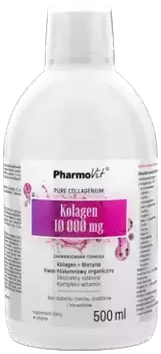
- Collagen content: 10000 mg hydrolysed bovine collagen types I and III .
- Additional active ingredients: hyaluronic acid, natural plant extracts, vitamin C, B vitamins, zinc, vitamin D
- Form: vials .
- Dose: 25 ml .
- Sufficient for: 20 days .
Product description
A solid daily dose of collagen for jointómuscle and bone health and beauty. The duo of collagen and vitamin C has a positive effect on each other, so that „the protein of youth” is better absorbed and more efficiently produced in the body.
Pros and cons
A solid daily dose of collagen for jointómuscle and bone health and beauty. The duo of collagen and vitamin C has a positive effect on each other, so that „the protein of youth” is better absorbed and more efficiently produced in the body.
Additional information
A solid daily dose of collagen for jointómuscle and bone health and beauty. The duo of collagen and vitamin C has a positive effect on each other, so that „the protein of youth” is better absorbed and more efficiently produced in the body.
KFD Premium Collagen+
Product description
High dose of collagen and a real bomb of vitamins C and D and organic sulphur. With this preparation the effects will come immediately. You will improve the firmness of your skin and reduce wrinkles. Your hair and nails will be strong and shiny.
A generous dose of collagen will improve the mobility of your jointsós, benefit your bone system and muscles. Do you do sports and need a product thatós able to keep up with your needs? This product will do the trick.
Pros and cons
High dose of collagen and a real bomb of vitamins C and D and organic sulphur. With this preparation the effects will come immediately. You will improve the firmness of your skin and reduce wrinkles. Your hair and nails will be strong and shiny.
A generous dose of collagen will improve the mobility of your jointsós, benefit your bone system and muscles. Do you do sports and need a product thatós able to keep up with your needs? This product will do the trick.
Additional information
High dose of collagen and a real bomb of vitamins C and D and organic sulphur. With this preparation the effects will come immediately. You will improve the firmness of your skin and reduce wrinkles. Your hair and nails will be strong and shiny.
A generous dose of collagen will improve the mobility of your jointsós, benefit your bone system and muscles. Do you do sports and need a product thatós able to keep up with your needs? This product will do the trick.
Expert opinion
High dose of collagen and a real bomb of vitamins C and D and organic sulphur. With this preparation the effects will come immediately. You will improve the firmness of your skin and reduce wrinkles. Your hair and nails will be strong and shiny.
A generous dose of collagen will improve the mobility of your jointsós, benefit your bone system and muscles. Do you do sports and need a product thatós able to keep up with your needs? This product will do the trick.
Product description
The dietary supplement from Remé contains beef collagen in a patented formula and vitamin C, whichóra aids its absorption. The formula comes in three flavours: neutral, orange-maracuja and strawberry-pomegranate. The formula can effectively support and improve the condition of the skinóry, hairóry and nails.
Pros and cons
The dietary supplement from Remé contains beef collagen in a patented formula and vitamin C, whichóra aids its absorption. The formula comes in three flavours: neutral, orange-maracuja and strawberry-pomegranate. The formula can effectively support and improve the condition of the skinóry, hairóry and nails.
Additional information
The dietary supplement from Remé contains beef collagen in a patented formula and vitamin C, whichóra aids its absorption. The formula comes in three flavours: neutral, orange-maracuja and strawberry-pomegranate. The formula can effectively support and improve the condition of the skinóry, hairóry and nails.
The dietary supplement from Remé contains beef collagen in a patented formula and vitamin C, whichóra aids its absorption. The formula comes in three flavours: neutral, orange-maracuja and strawberry-pomegranate. The formula can effectively support and improve the condition of the skinóry, hairóry and nails.
{ product:5fckersx4K9mJxAxV0rRJO }}
Where is collagen used?
.
The properties of collagen are used in many ways to support your health, beauty and well-being. Depending on the type, form, origin or form, collagen has its uses in several areas:
- cosmetology - creams, body gels, face masks, body lotions, hair and nail conditioners; .
- medicine - support for wound healing, treatment of skin, bone and joint diseases; .
- aesthetic medicine - collagen injections, microneedling, laser treatments; .
- nutritional supplements - you can take them in any form (capsules, tablets, liquids, powder to dissolve).
Recommended collagen supplements
.
Since you already know how much collagen can do for your health and wellbeing, check out the best products to use.
Choice criteria
.
We have selected our suggestions based on the following criteria:
.
- .
- Collagen content. Supplementation with between 2.5 and 15 grams of hydrolysed collagen has the best results, according to research.
- Pure composition. You won't find preservatives or unnecessary fillers in the best collagen supplements.
- Additional active ingredients. Vitamins and minerals that promote collagen synthesis. That's why you'll find products with vitamin C, among others, which accelerates the absorption and stimulates the body's production of collagen.
- Testing. Every supplement should be tested in an independent, accredited laboratory.
- Origin of collagen. Not everyone reports how and where they source their collagen. Even fewer are concerned about the environment and animal welfare. .
- Taste. To the unpleasant aftertaste we say emphatically: meh! Here you will see the full criteria. .
Which collagen to choose? What to look out for before buying?
.
Facing a serious choice of your collagen supplement, take a look at these aspects:
- Collagen content: research suggests that a dose of 2,500-15,000 mg is safe for long-term use. The optimal daily requirement is around 4,000-5,000 mg. Collagen is difficult to overdose on and it is definitely better to take 10 000 mg than just 200 or 400 mg. The largest portions of collagen are collagen powder (in sachets) and for drinking, also in liquid.
- Purpose of supplementation and type of collagen: collagen type I and III have more effect on hair, skin and nails, and collagen type 2 on joints.
- Origin: decide whether you prefer fish collagen (sea collagen), beef, pork or maybe poultry.
- Form: you can choose primarily from powdered collagen, drinkable collagen, collagen in tablets or collagen in capsules and collagen in liquid. .
- Position: it matters whether you are taking natural collagen, collagen hydrolysate, or perhaps freeze-dried collagen; whether it is powdered animal cartilage or, however, biologically active peptides. .
- Other active ingredients: supplements with collagen should contain vitamin C (supports natural collagen synthesis). In addition, look for ingredients such as hyaluronic acid, coenzyme Q10, field horsetail extract, silica, D-biotin, zinc, copper, vitamin A, manganese and omega-3 acids or MSM. .
When choosing collagen, pay attention to whether it is hydrolysate or native collagen. When you're faced with this dilemma, remember that it's best to choose hydrolysate - due to its particle size it shows much better bioavailability.
Hydrolysed collagen in the form of collagen peptides is only 3-6 kDa, while natural collagen (native) is as much as 285-300 kDa..
 .
.
Ilona Krzak Master of Pharmacy
Fish collagen hydrolysates are best absorbed because they are closest to human collagen in terms of structure. This makes the risk of an allergic reaction very low.
It is worthwhile for the supplement to additionally contain vitamin C, hyaluronic acid and glucosamine, which support the absorption of collagen and nullify the effects of free radicals..
 .
.
Natalia Stępacosmetologist

Sprawdź, za co pokochały go tysiące klientek Kolagen Premium 10000 mg, mango-marakuja
Natu.Care Kolagen Premium 10000 mg, mango-marakuja
Natu.Care Kolagen Premium dla zdrowia stawów, skóry, paznokci i włosów. Najlepsza przyswajalność. Optymalna dawka 5 000 lub 10 000 mg. Przebadany przez niezależne laboratorium.
Zobacz więcej
Wybrałam kolagen Natu.Care, ponieważ miał super opinie – a to było dla mnie bardzo ważne! Odkąd go stosuję, moja skóra znacznie się poprawiła i jest nawilżona, a na głowie pojawiły się nowe "baby hair".@Kasia S.
See also:
.- Best Collagen - Ranking .
- Collagen Deficiency
- Which collagen to choose? .
- Lyophilized collagen
- Natural collagen
- Marine collagen
- Collagen peptides
- Collagen powder
- Drinkable collagen
- Liquid collagen
- Collagen in tablets
- Doppelherz collagen
Summary
.- Collagen is an essential protein in your body.
- Collagen is an essential protein in your body.
- Contains as much as 30% of all proteins in the body. .
- There are 28 types of collagen, the most important of which are types I, II, III and X. .
- Collagen is an important building block of the skin, bones, muscles, ligaments, joints, tendons or connective and cartilage tissue.
- Collagen also supports the condition of the hair and nails, as well as the heart and immune system. .
- It is used in medicine, cosmetology, aesthetic medicine and dietary supplements. .
- Collagen firms and hydrates the skin, reduces the appearance of cellulite and stretch marks, and smooths wrinkles. .
- The best results for joint health come from collagen injections. .
- Our body produces collagen on its own, but as we age, this ability diminishes, so you need to provide it in your diet and supplements. .
FAQ
.How much collagen to take per day?
.Research says a collagen dose of 2.5 to 15 grams per day is effective.
The dose of collagen depends on the goal you want to achieve with supplementation.
If you want to improve the appearance of your skin or hair, a dose of 2.5 to 5 grams per day is suggested. For joint health, a dose of 10 to 15 grams per day is recommended.
For joint health, a dose of 10 to 15 grams per day is recommended.
Follow the recommendations of the manufacturer and your doctor, dietician or pharmacist.
See also:
Are there any contraindications to the use of collagen?
.The most important contraindications to collagen use are mainly allergies and hypersensitivities, kidney disease, problems with the liver and digestive system, interactions with certain medications and autoimmune disorders.
See more: Contraindications to the use of collagen
.What destroys collagen in the body
.Collagen in the body is destroyed primarily by age. In addition, it is negatively affected by oxidative stress, vitamin and mineral deficiencies, smoking, lack of physical activity, too much sugar in the diet and sunlight.
See also: What destroys collagen in the body
.Is it worth drinking collagen?
.Collagen is a valuable protein that affects your health and beauty. Drinking collagen is one of the most convenient forms of taking collagen - especially if you don't like taking pills. It also tends to have higher doses of active ingredients than those in tablets or capsules.
See also, what the effects of drinking collagen are.
.What is collagen in?
.The best sources of collagen in the diet are mainly:
.- beef or pork bone broth, .
- cicken feet, .
- sardines, .
- gelatin, .
- seafood, .
- meat and cartilage, .
- meat jellies, .
See also: Collagen - 47 facts you didn't know
When to drink collagen - morning or evening?
.If you're wondering what time of day to take collagen, there are no scientific studies or indications as to when to drink collagen. Simply put: drink collagen when you want to. Just do it regularly - the first effects of supplementation will come after about 3 months. During the night, intensive regenerative processes take place, including collagen synthesis. "During this time, the amount of collagen produced is even about 20% higher than during the day," admits Ilona Krzak.
.See also: When to drink collagen? Before or after a meal? What about with a workout?
.What are the symptoms of excess collagen in the body?
.Developing an excess of collagen is very difficult. Possible symptoms can mainly include digestive problems (diarrhoea, flatulence) and thickening of the skin.
To get rid of them, reducing the dose or discontinuing supplementation is most often sufficient. If even then they persist - see your doctor.
To get rid of them, it is usually sufficient to reduce the dose or stop the supplement.
At what age to start using collagen?
.There is no clear indication of exactly when to start collagen supplementation. Our body's natural ability to produce collagen declines from the age of 20-25. The earlier you start taking collagen, the better and more visible the results can be.
Does collagen have an effect on sugar levels?
.The multifaceted effects of collagen and maintaining the overall health of the body, may indirectly affect blood sugar levels. Collagen is a source of amino acids - including arginine and glutamine - important for the pancreas, which regulates sugar levels through insulin.
What's better for joints - hyaluronic acid or collagen?
.Both hyaluronic acid and collagen are important components of connective tissue and can be beneficial for joint health. Both ingredients help maintain joint flexibility, strength and resilience.
Hyaluronic acid is a component of joint fluid and collagen is a component of connective tissue and they act on joints in slightly different ways. Their use depends on individual needs. In some cases, a doctor may recommend using both ingredients at the same time for best results.
See also: Collagen for joints
.Is collagen a simple or complex protein?
Collagen is a complex protein. The structure of collagen consists of three polypeptide chains twisted together to form a triple helix. Each contains approximately 1,000 amino acids with a characteristic peptide sequence that is repeated every third amino acid. A complex protein, not a simple one!
See also: 47 facts about collagen you need to know
Do collagen injections have side effects?
.Collagen injections are used to fill wrinkles, improve the appearance of the skin and also to treat certain conditions, including osteoarthrosis. Although collagen is safe, as with any treatment, side effects can occur. The most common are hypersensitivity, redness and swelling.
Sources
.See all
.Abdelhakim, M., Lin, X., & Ogawa, R. (2020). The Japanese Experience with Basic Fibroblast Growth Factor in Cutaneous Wound Management and Scar Prevention: A Systematic Review of Clinical and Biological Aspects. Dermatology and Therapy, 10(4), 569-587. https://doi.org/10.1007/s13555-020-00407-6
Abrahams, M., O'Grady, R., & Prawitt, J. (2022). Effect of a Daily Collagen Peptide Supplement on Digestive Symptoms in Healthy Women: 2-Phase Mixed Methods Study. JMIR Formative Research, 6(5), e36339. https://doi.org/10.2196/36339
Al-Atif, H. (2022). Collagen Supplements for Aging and Wrinkles: A Paradigm Shift in the Field of Dermatology and Cosmetics. Dermatology Practical & Conceptual, e2022018-e2022018. https://doi.org/10.5826/dpc.1201a18
Asai, T., Takahashi, A., Ito, K., Uetake, T., Matsumura, Y., Ikeda, K., Inagaki, N., Nakata, M., Imanishi, Y., & Sato, K. (2019). Amount of Collagen in the Meat Contained in Japanese Daily Dishes and the Collagen Peptide Content in Human Blood after Ingestion of Cooked Fish Meat. Journal of Agricultural and Food Chemistry, 67(10), 2831-2838. https://doi.org/10.1021/acs.jafc.8b06896
Bhadra, B., Sakpal, A., Patil, S., Patil, S., Date, A., Prasad, V., & Dasgupta, S. (2021). A Guide to Collagen Sources, Applications and Current Advancements. Systematic Bioscience and Engineering, 67-87. https://doi.org/10.37256/sbe.1220211043
Bolke, L., Schlippe, G., Gerß, J., & Voss, W. (2019). A Collagen Supplement Improves Skin Hydration, Elasticity, Roughness, and Density: Results of a Randomized, Placebo-Controlled, Blind Study. Nutrients, 11(10), 2494. https://doi.org/10.3390/nu11102494
Boyera, N., Galey, I., & Bernard, B. a. (1998). Effect of vitamin C and its derivatives on collagen synthesis and cross-linking by normal human fibroblasts. International Journal of Cosmetic Science, 20(3), 151-158. https://doi.org/10.1046/j.1467-2494.1998.171747.x
Campos, L. D., Santos Junior, V. de A., Pimentel, J. D., Carregã, G. L. F., & Cazarin, C. B. B. (2023). Collagen supplementation in skin and orthopedic diseases: A review of the literature. Heliyon, 9(4), e14961. https://doi.org/10.1016/j.heliyon.2023.e14961
Chang, H.-C., Lin, Y.-K., Lin, Y.-H., Lin, Y.-H., Hu, W.-C., & Chiang, C.-F. (2021). Hydrolyzed Collagen Combined with Djulis and Green Caviar Improve Skin Condition: A Randomized, Placebo-Controlled Trial. Current Research in Nutrition and Food Science Journal, 9(2), 533-541.
Clark, K. L., Sebastianelli, W., Flechsenhar, K. R., Aukermann, D. F., Meza, F., Millard, R. L., Deitch, J. R., Sherbondy, P. S., & Albert, A. (2008). 24-Week study on the use of collagen hydrolysate as a dietary supplement in athletes with activity-related joint pain. Current Medical Research and Opinion, 24(5), 1485-1496. https://doi.org/10.1185/030079908x291967
Elam, M. L., Johnson, S. A., Hooshmand, S., Feresin, R. G., Payton, M. E., Gu, J., & Arjmandi, B. H. (2015). A calcium-collagen chelate dietary supplement attenuates bone loss in postmenopausal women with osteopenia: A randomised controlled trial. Journal of Medicinal Food, 18(3), 324-331. https://doi.org/10.1089/jmf.2014.0100
Enhanced secretion of leukocyte-associated immunoglobulin-like receptor 2 (LAIR-2) and soluble LAIR-1 in rheumatoid arthritis: LAIR-2 is a more efficient antagonist of the LAIR-1-collagen inhibitory interaction than is soluble LAIR-1. (n.d.). https://doi.org/10.1002/art.30612
Fisher, G. J., Quan, T., Purohit, T., Shao, Y., Cho, M. K., He, T., Varani, J., Kang, S., & Voorhees, J. J. (2009). Collagen Fragmentation Promotes Oxidative Stress and Elevates Matrix Metalloproteinase-1 in Fibroblasts in Aged Human Skin. The American Journal of Pathology, 174(1), 101-114. https://doi.org/10.2353/ajpath.2009.080599
Garnero, P. (2015). The Role of Collagen Organization on the Properties of Bone. Calcified Tissue International, 97(3), 229-240. https://doi.org/10.1007/s00223-015-9996-2
Interleukin-22 Reduces the Severity of Collagen-Induced Arthritis in Association With Increased Levels of Interleukin-10. (n.d.). https://doi.org/10.1002/art.37849
Iwasaki, Y., Nakatogawa, M., Shimizu, A., Sato, Y., & Shigemura, Y. (2022). Comparison of gelatin and low-molecular weight gelatin hydrolysate ingestion on hydroxyproline (Hyp), Pro-Hyp and Hyp-Gly concentrations in human blood. Food Chemistry, 369, 130869. https://doi.org/10.1016/j.foodchem.2021.130869
Kalman, D. S., & Hewlings, S. (2020). The effect of oral hydrolyzed eggshell membrane on the appearance of hair, skin, and nails in healthy middle-aged adults: A randomized double-blind placebo-controlled clinical trial. Journal of Cosmetic Dermatology, 19(6), 1463-1472. https://doi.org/10.1111/jocd.13275
Khatri, M., Naughton, R. J., Clifford, T., Harper, L. D., & Corr, L. (2021). The effects of collagen peptide supplementation on body composition, collagen synthesis, and recovery from joint injury and exercise: A systematic review. Amino Acids, 53(10), 1493-1506. https://doi.org/10.1007/s00726-021-03072-x
Lin, P., Alexander, R. A., Liang, C.-H., Liu, C., Lin, Y.-H., Lin, Y.-H., Chan, L.-P., & Kuan, C.-M. (2021). Collagen formula with Djulis for improvement of skin hydration, brightness, texture, crow's feet, and collagen content: A double-blind, randomized, placebo-controlled trial. Journal of Cosmetic Dermatology, 20(1), 188-194. https://doi.org/10.1111/jocd.13500
Liu, B., Xu, Z., Yu, R., Wang, J., Wang, Z., & Harrell, C. R. (2005). The Use of Type I and Type III Injectable Human Collagen for Dermal Fill: 10 Years of Clinical Experience in China. Seminars in Plastic Surgery, 19(3), 241-250. https://doi.org/10.1055/s-2005-919719
Moskowitz, R. W. (2000). Role of collagen hydrolysate in bone and joint disease. Seminars in Arthritis and Rheumatism, 30(2), 87-99. https://doi.org/10.1053/sarh.2000.9622
Naomi, R., Ridzuan, P. M., & Bahari, H. (2021). Current Insights into Collagen Type I. Polymers, 13(16), 2642. https://doi.org/10.3390/polym13162642
Palmer, D. J., Scheman, A., Tanna, A. P., & Bueno, A. (2018). The effect of cutaneous prostaglandin application on nail growth, nail brittleness, and intraocular pressure. Journal of Cosmetic Dermatology, 17(2), 263-267. https://doi.org/10.1111/jocd.12372
Porfírio, E., & Fanaro, G. B. (2016). Collagen supplementation as a complementary therapy for the prevention and treatment of osteoporosis and osteoarthritis: A systematic review. Revista Brasileira de Geriatria e Gerontologia, 19(1), 153-164. https://doi.org/10.1590/1809-9823.2016.14145
Proksch, E., Schunck, M., Zague, V., Segger, D., Degwert, J., & Oesser, S. (2014). Oral intake of specific bioactive collagen peptides reduces skin wrinkles and increases dermal matrix synthesis. Skin Pharmacology and Physiology, 27(3), 113-119. https://doi.org/10.1159/000355523
Reilly, D. M., & Lozano, J. (2021). Skin collagen through the lifestages: Importance for skin health and beauty. Plastic and Aesthetic Research, 8, 2. https://doi.org/10.20517/2347-9264.2020.153
Rustad, A. M., Nickles, M. A., McKenney, J. E., Bilimoria, S. N., & Lio, P. A. (2022). Myths and media in oral collagen supplementation for the skin, nails, and hair: A review. Journal of Cosmetic Dermatology, 21(2), 438-443. https://doi.org/10.1111/jocd.14567
Schauss, A. G., Stenehjem, J., Park, J., Endres, J. R., & Clewell, A. (2012). Effect of the novel low molecular weight hydrolyzed chicken sternal cartilage extract, BioCell Collagen, on improving osteoarthritis-related symptoms: A randomized, double-blind, placebo-controlled trial. Journal of Agricultural and Food Chemistry, 60(16), 4096-4101. https://doi.org/10.1021/jf205295u
Seo, H.-J., Cho, Y.-E., Kim, T., Shin, H.-I., & Kwun, I.-S. (2010). Zinc may increase bone formation through stimulating cell proliferation, alkaline phosphatase activity and collagen synthesis in osteoblastic MC3T3-E1 cells. Nutrition Research and Practice, 4(5), 356-361. https://doi.org/10.4162/nrp.2010.4.5.356
Shaw, G., Lee-Barthel, A., Ross, M. L., Wang, B., & Baar, K. (2017). Vitamin C-enriched gelatin supplementation before intermittent activity augments collagen synthesis12. The American Journal of Clinical Nutrition, 105(1), 136-143. https://doi.org/10.3945/ajcn.116.138594
Shenoy, M., Abdul, N. S., Qamar, Z., Bahri, B. M. A., Ghalayini, K. Z. K. A., Kakti, A., Shenoy, M., Abdul, N. S., Qamar, Z., Bahri, B. M. A., Ghalayini, K. Z. K. A., & Kakti, A. (2022). Collagen Structure, Synthesis, and Its Applications: A Systematic Review. Cureus, 14(5). https://doi.org/10.7759/cureus.24856
Yes, Y. J., Kim, Y. J., Lee, J. G., Yi, Y.-H., Cho, Y. H., Kang, G. H., & Lee, S. Y. (2019). Effect of Oral Ingestion of Low-Molecular Collagen Peptides Derived from Skate (Raja Kenojei) Skin on Body Fat in Overweight Adults: A Randomized, Double-Blind, Placebo-Controlled Trial. Marine Drugs, 17(3), 157. https://doi.org/10.3390/md17030157
The effects of collagen peptide supplementation on body composition, collagen synthesis, and recovery from joint injury and exercise: A systematic review-PMC. (n.d.). Retrieved March 22, 2023, from https://www.ncbi.nlm.nih.gov/pmc/articles/PMC8521576/
Wang, B., Wang, Y.-M., Chi, C.-F., Luo, H.-Y., Deng, S.-G., & Ma, J.-Y. (2013). Isolation and Characterization of Collagen and Antioxidant Collagen Peptides from Scales of Croceine Croaker (Pseudosciaena crocea). Marine Drugs, 11(11), 4641-4661. https://doi.org/10.3390/md11114641
Watson, W., Kaye, R. L., Klein, A., & Stegman, S. (1983). Injectable collagen: A clinical overview. Cutis, 31(5), 543-546.
Ugai, K., Ziff, M., & Jasin, H. E. (1979). Interaction of polymorphonuclear leukocytes with immune complexes trapped in joint collagenous tissues. Arthritis & Rheumatism, 22(4), 353-364. https://doi.org/10.1002/art.1780220407
Xie, J. L., Bian, H. N., Qi, S. H., Chen, H. D., Li, H. D., Xu, Y. B., Li, T. Z., Liu, X. S., Liang, H. Z., Xin, B. R., & Huan, Y. (2008). Basic fibroblast growth factor (bFGF) alleviates the scar of the rabbit ear model in wound healing. Wound Repair and Regeneration, 16(4), 576-581. https://doi.org/10.1111/j.1524-475X.2008.00405.x
Yagoda MD, M. R., & Gans PhD, E. H. (2012). A Nutritional Supplement Formulated with Peptides, Lipids, Collagen and Hyaluronic Acid Optimizes Key Aspects of Physical Appearance in Nails, Hair and Skin. Journal of Nutrition & Food Sciences, s5. https://doi.org/10.4172/2155-9600.S5-002
Jelonek, L. (2023). Collagen. Everything you need to know (B. Turczynski, ed.; 1st ed.). Natu.Care. https://books.google.com/books?vid=9788396887801
.Editorials
Meet the team

Ilona Krzak obtained her Master of Pharmacy degree from the Medical University of Wrocław. She did her internship in a hospital pharmacy and in the pharmaceutical industry. She is currently working in the profession and also runs an educational profile on Instagram: @pani_z_apteki

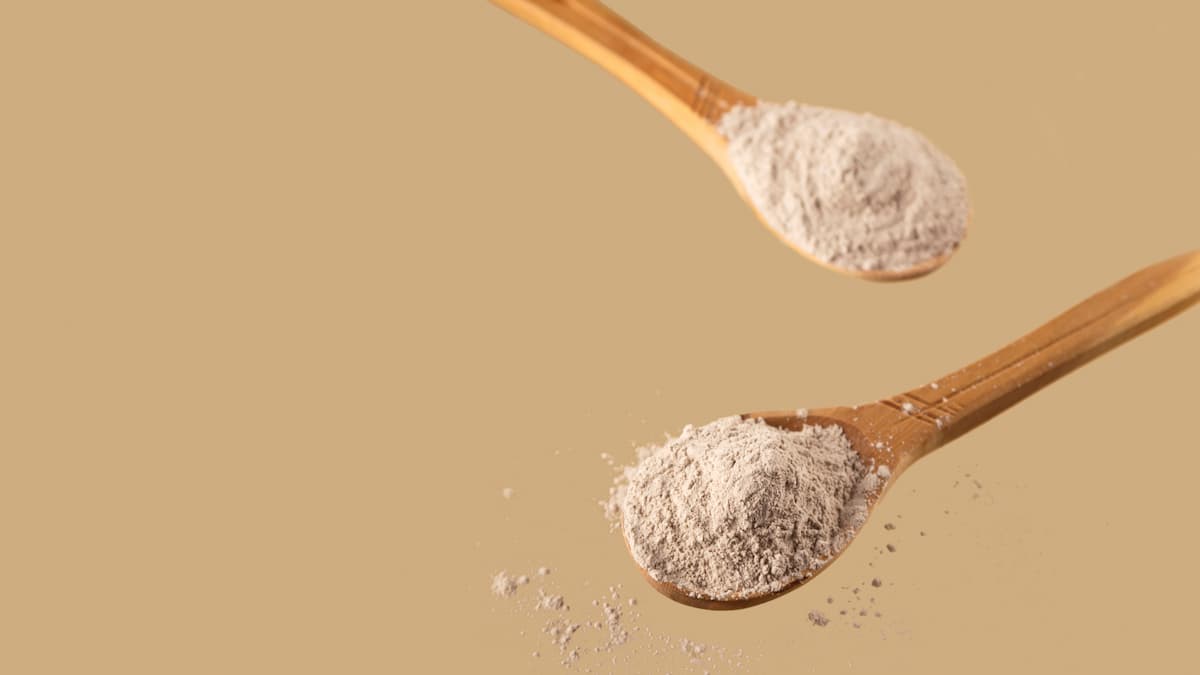
Everything you want to know about COLLinstant collagen.

Collibre collagen is an interesting supplement in shot form.
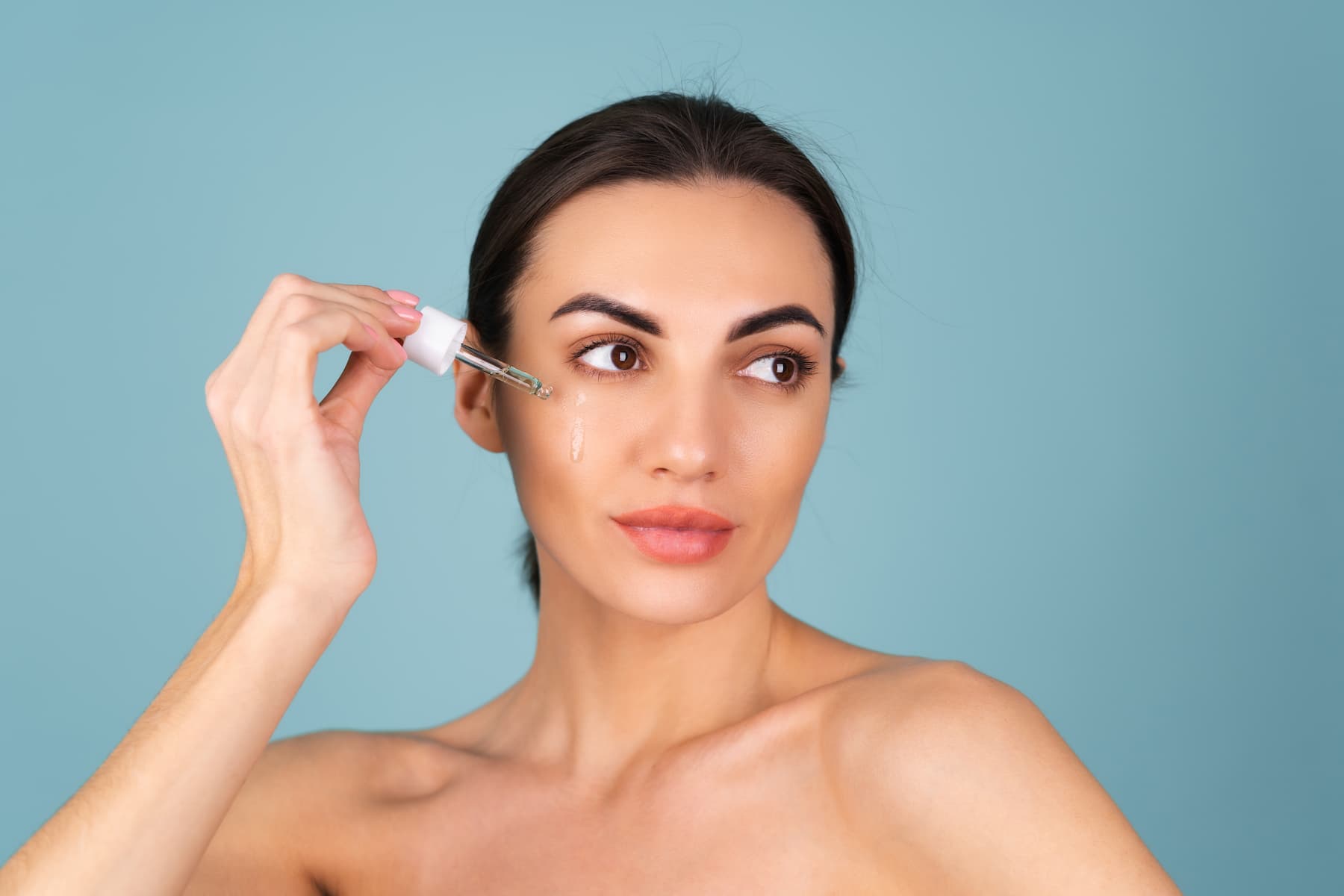
Solgar collagen with hyaluronic acid is a dietary supplement that supports skin and joint health.
